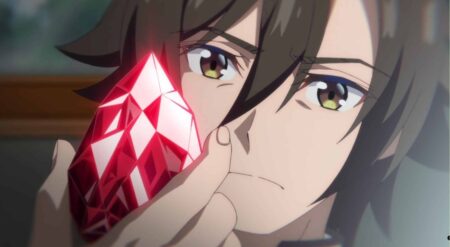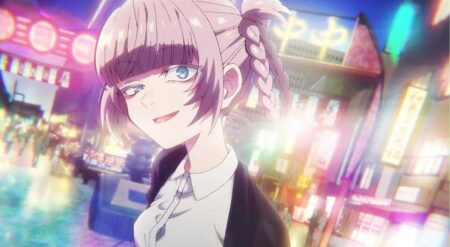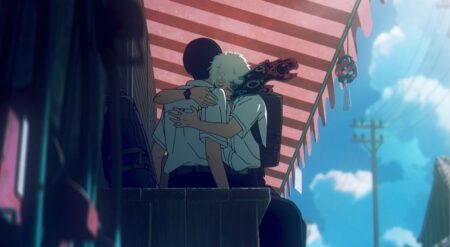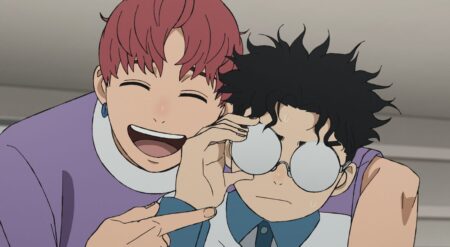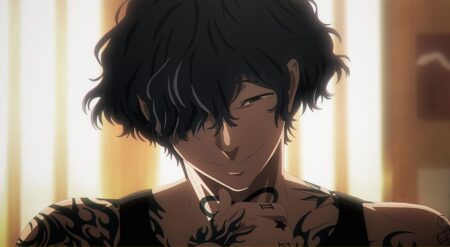Based on the manga written and illustrated by Satoshi Mizukami, Sengoku Youko Episode 1 delivers a mostly intriguing start. Laden with exposition as we’re force fed being acclimated to this world, the White Fox production excels in specific moments of animation grandeur. While clunky in some of the delivery, the overall effect is engaging. The hollowness of the writing finds balance through solid ideas and even stronger visuals, which should ideally become stronger with time. Directed by Masahiro Aizawa, the series starts on solid footing as we’re thrown straight into the mix.
Adapted by Jukki Hanada, Sengoku Youko Episode 1 introduces a world split in two. There are humans and then monsters called katawara. Tama (Yūki Takada) sits in the gray area, a “youko” — a fox spirit. She seeks to stamp out evil in the world, whether that means fighting for or against humans, even if it means fighting against her kind. Her swoon sibling, Jinka (Soma Saito,) is mostly human but despises his kind. Jinka describes himself as “something of an ascetic sage, a sendou” to Shinsuke (Ryōhei Kimura,) a cowardly swordsman who accidentally joins their exploits.
The premiere, “We Are Those Who Lament This Barbaric Age,” quickly sets the tone with classical art styles. The watercolor paper effect establishes the historical place and time. Despite the patience in transitional frames and establishing shots, the premiere quickly pushes the audience through many different terms and groups, from outlaws to warrior monks. With three cours ahead, the amount of information given suggests an impressive amount of worldbuilding as this is just the beginning.
Despite the heavy exposition and out-of-place humor, the anime is commendable in its most significant action set piece. Jinka, facing off with a disguised katawara, enacts his spirit transformation with the aid of Tama, becoming more of a spirit himself. The character designs by Yosuke Okuda come alive, breathing greater fantasy and magic as Jinka’s black hair turns white and his strength grows. The entire sequence stuns with more incredible vibrancy. Before this moment, the scene-to-scene animation was serviceable, if a bit bland, but the action elevates it.
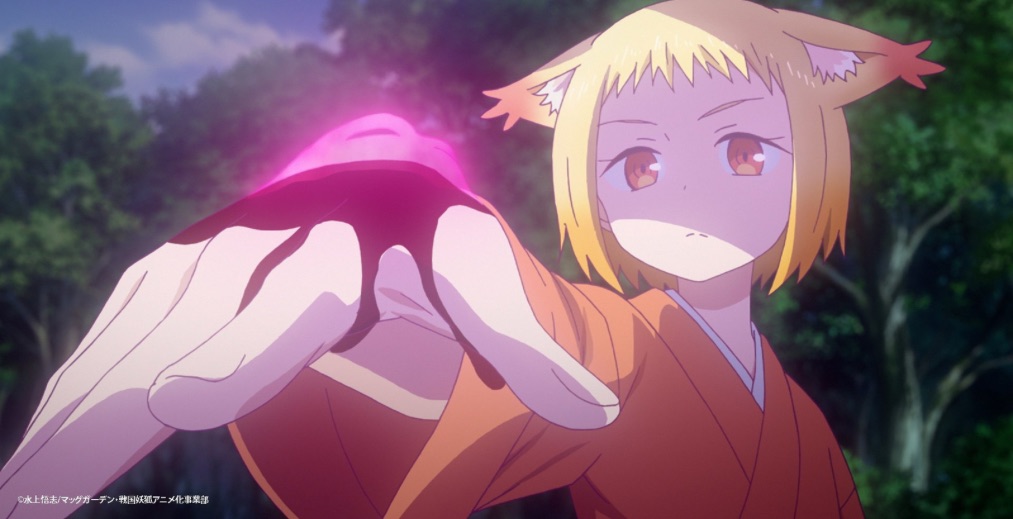
If anything (and this is a real nitpick,) the action only lacks follow-through. The animation is fluid itself, but it dissipates slightly in the combat. We witness plenty of moments where the action begins or when a blow lands, but less the movement that gets us from the swing to the impact. For a more substantial effect, there needs to be greater fluidity and direction that pulls back to capture the entire sequence rather than blocking it all in short, close-up bursts.
From the blood used to start the transformation, the sparks that fly from Tama and Jinka to Jinka’s final form and his fight choreography, the moment bursts with energy. This, plus the background scene and panels, are the most effective. The backgrounds and specific classical sound design motifs create traditional visuals without ever relenting on the fantasy.
The characters themselves still need room to grow, Shinsuke in particular. Tama and Jinka make for an entertaining pair, especially with Jinka’s evident disdain for humans. But Shinsuke adheres too close to the standard protagonist, leeching off the other two’s adventures to grow stronger. It’s not his cowardice that hinders the story; he can’t just be the audience insert.
Sengoku Youko Episode 1 is a compelling premiere. While lacking in narrative urgency despite the heavy exposition, it’s visually captivating. Ending on a cliffhanger as Jinka faces down a strong katawara, the series successfully keeps our interest from the starting notes to the end. There’s definite room to grow, but for now, we need to see at least how this battle ends.
Sengoku Youko Episode 1 is available now on Crunchyroll.
Sengoku Youko Episode 1
-
Rating - 7/107/10
TL;DR
Sengoku Youko Episode 1 is a compelling premiere. While lacking in narrative urgency despite the heavy exposition, it’s visually captivating. Ending on a cliffhanger as Jinka faces down a strong katawara, the series successfully keeps our interest from the starting notes to the end.


